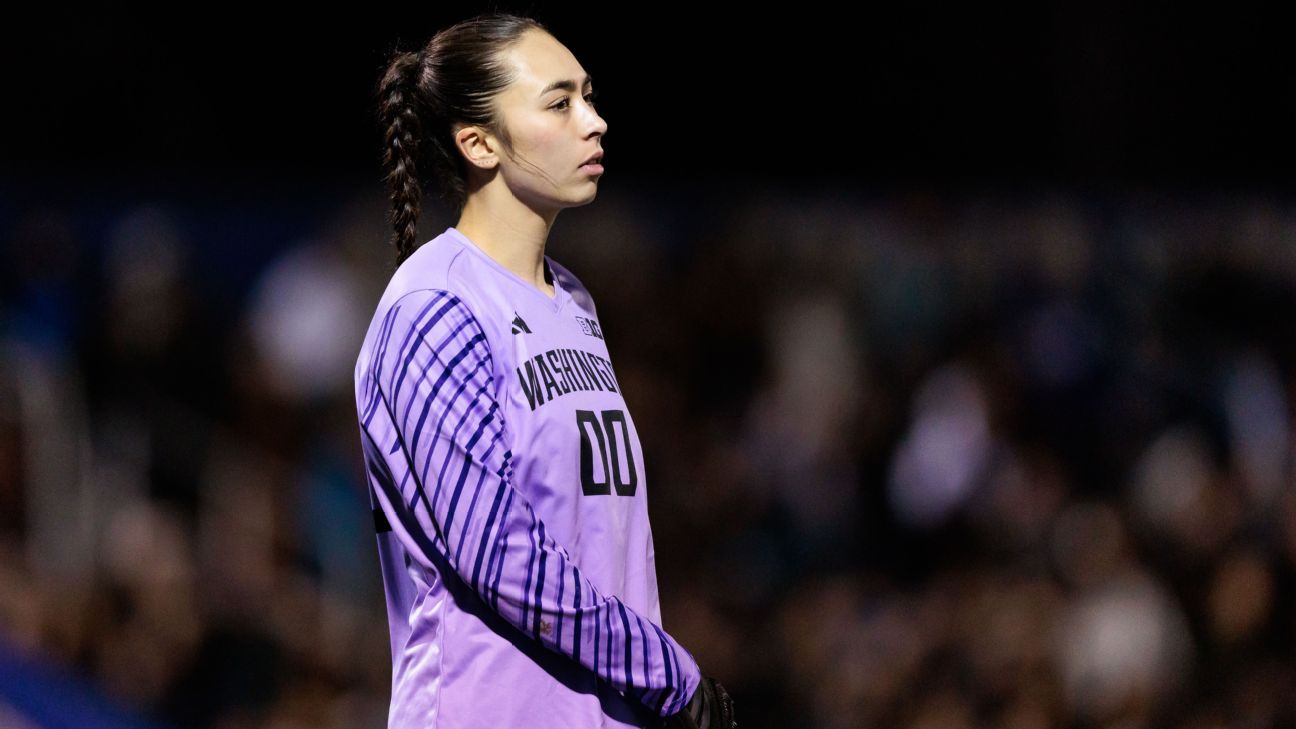SEATTLE — Mia Hamant, a standout goalkeeper for the University of Washington's women's soccer team, died Thursday from kidney cancer, the university announced. She was 21 years old.
Hamant, who helped lead the Huskies to the semifinals of the Big Ten tournament during her junior year, had been diagnosed with Stage 4 kidney cancer in April. She stepped away from the team to undergo chemotherapy treatment, missing her senior season entirely.
According to a statement from the university, Hamant passed away after a courageous battle with the disease. The news sent shockwaves through the Washington athletic community, where she was remembered for her exceptional talent on the field and her inspiring spirit off it.
In 2024, Hamant emerged as one of the top goalkeepers in the Big Ten Conference. She recorded the third-lowest single-season goals-against average in the program's history, at 0.66, showcasing her skill and dedication to the sport.
Women's soccer coach Nicole Van Dyke praised Hamant in a statement, highlighting her profound impact on the team.
“Mia was the heart of our program -- someone who lifted up everyone around her with her joy, courage, and kindness,” Van Dyke said. “Even in the most difficult moments, she showed an unshakable spirit that inspired her teammates and coaches every single day. Mia made us all better people, and her impact will be felt in this program and in all of our lives forever.”
Hamant's diagnosis came suddenly in April, forcing her to prioritize her health over her athletic career. Despite the challenges, she remained connected to the university's sports scene. Just two weeks before her death, on October 25, she attended the Huskies' football game against No. 23 Illinois, where Washington secured a 42-25 victory. Hamant even sounded the siren at Husky Stadium, a symbolic gesture that resonated with fans and players alike.
Support for Hamant poured in from across the athletic department. After the football win, wide receiver Denzel Boston spoke about her struggles and the team's efforts to rally around her.
“Mia Hamant on our soccer team is going through tough, tough struggles with cancer,” Boston said. “We're just trying to be there to support her.”
The Big Ten Conference recognized Hamant's resilience by awarding her the 2025 Sportsmanship Award earlier this week. The honor came as a testament to her character amid adversity, even as she was unable to compete in her final season.
Athletic director Pat Chun also issued a statement mourning the loss.
“The University of Washington grieves the heartbreaking loss of Mia Hamant, whose strength, kindness, and spirit touched everyone around her,” Chun said. “Mia embodied everything we hope for in a Husky student-athlete -- perseverance, grace, and an unwavering commitment to her teammates and community. Her remarkable courage through adversity and the legacy she leaves behind will forever inspire the UW family.”
Washington Athletics shared a heartfelt message on social media, accompanied by a photo and the university's purple and gold colors.
“We are heartbroken by the passing of Mia Hamant after her courageous battle with cancer. Mia inspired everyone around her with her strength and spirit. Our love is with her family, teammates, and all who knew her. Her legacy will forever live in Husky Athletics. 💜🐾”the post read, reflecting the widespread grief within the community.
Hamant, a native of an undisclosed hometown, is survived by her parents. Details about her early life and path to the University of Washington were not immediately available, but her contributions to the soccer program were undeniable. As a junior, she played a key role in the team's run to the Big Ten semifinals, demonstrating poise under pressure that earned her respect from peers and coaches.
The university did not release specifics about her treatment or the progression of her illness beyond the initial Stage 4 diagnosis. Kidney cancer, particularly at an advanced stage, is known for its aggressive nature, often requiring intensive therapies like chemotherapy, which Hamant underwent starting in the spring.
In the broader context of college athletics, Hamant's story highlights the vulnerabilities faced by student-athletes, who balance rigorous training with personal health challenges. The Huskies' women's soccer team, part of the Big Ten since Washington's conference realignment, has seen its share of successes, but Hamant's absence this season underscored the human element behind the competition.
As news of her death spread, tributes continued to emerge from former teammates, fans, and rival programs. The university plans to honor her legacy in upcoming games, though specific details have not been announced. Her impact, as described by those who knew her, extends beyond statistics and wins, focusing instead on the positivity she brought to those around her.
Looking ahead, the Washington community faces the task of moving forward while preserving Hamant's memory. Her story serves as a reminder of the fragility of life, even among the young and talented, and may inspire greater awareness and support for cancer research within collegiate sports circles.
